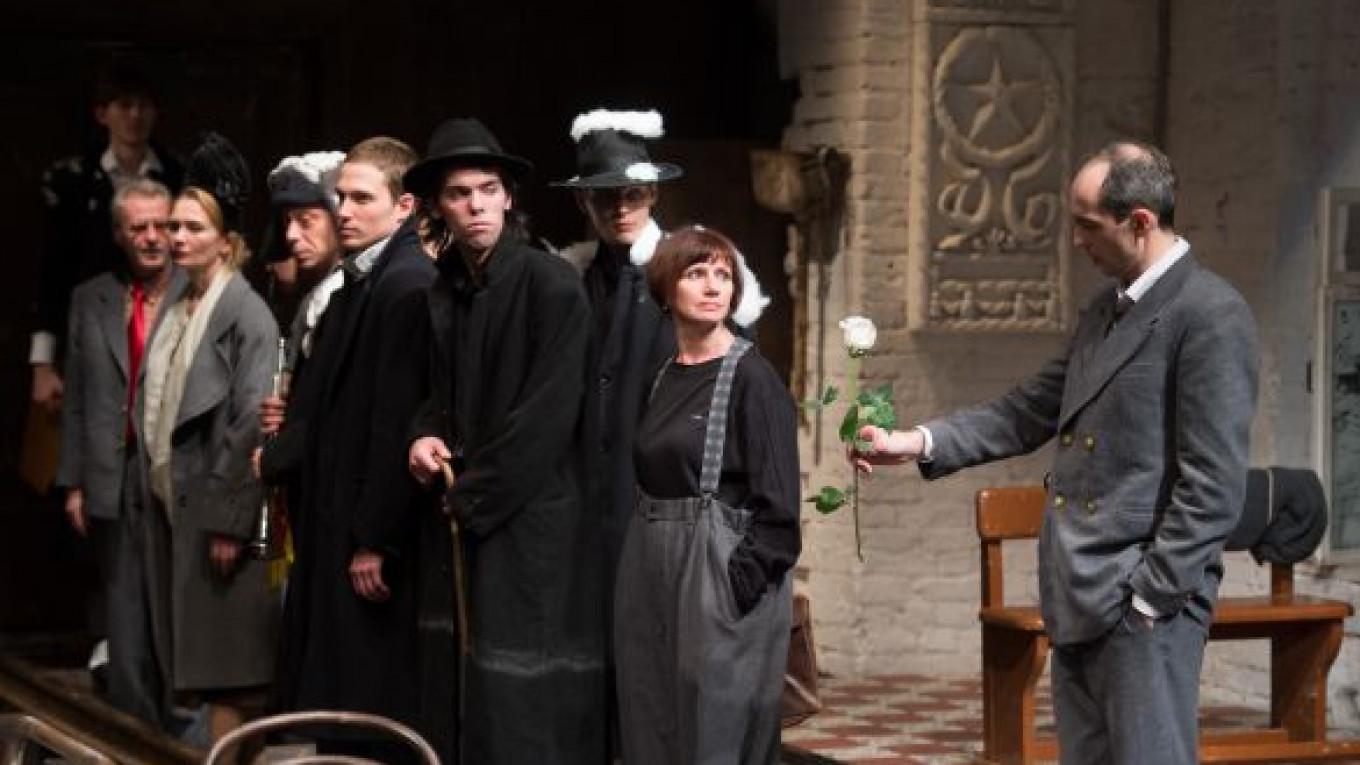One of the true literary wonders of the late Soviet period was Sasha Sokolov's novel "A School for Fools." According to the history books it was written in the 1960s, but its publication by Ardis in 1976 truly brought it to the attention of the world. Vladimir Nabokov's blurb calling it "charming, tragic and touching" didn't hurt.
The story is a remarkable one. A young schizophrenic boy in a school for children with special needs leads a full, rich life of the imagination, falling in love, taking sides against enemies — including his own psychologically split self — and perceiving the wonders of the world around him no matter what the reality may be.
A handful of directors have dramatized the novel over the years, the latest being Yury Pogrebnichko at Okolo, the Theater Near the Stanislavsky House.
I find the combination of Sokolov and Pogrebnichko a near impossibility.
Sokolov's rich, unorthodox prose has a spectacular naivete encrusted in it by the firm hand of a true writer. He himself labeled his work "proetry," indicating that the superficial form may be prose, but that the inner, structural workings had the complexity of poetry. "A School for Fools" specifically was a book written from the point of view of a boy who possessed a tremendous imagination, a deep sense of idealism and, most important, a profound awe before the mysteries of the world.
Pogrebnichko over the years has evolved a monotone theatrical style that he applies equally to all texts, no matter how different they may be. Whether he is staging Nikolai Gogol, Alexander Ostrovsky, Anton Chekhov or a contemporary writer, Pogrebnichko's actors shuffle stiffly about the stage and interpret their characters with the same deadpan expressions occasionally broken up by the same knowing grins.
There is no doubting that Pogrebnichko's style is steadfastly grounded in the director's personal artistic vision. His is a style you will see nowhere else. Understandably he has acquired a loyal following and is revered by his fans as a master. I have seen numerous of his productions that powerfully revealed new aspects in old works.
"A School for Fools" is not among them.
Pogrebnichko has spent most of his 25 years in Moscow exploring the secrets, details and realities of the Soviet experience. When staging Gogol's "The Marriage," for instance, he dressed his actors in the rough quilted jackets worn by prisoners in the Soviet Gulag. It was a marvelous artistic anachronism that sparked new meaning in the familiar play.
A similar, Soviet-centric approach to Tatyana Orlova's contemporary play "Occupation" worked well for another reason. Her play was a memoir of life in the Soviet period — it met the director's aesthetic on common ground.
Sokolov is another thing altogether. What struck readers at the time his first book appeared — and what still strikes me as I hold it in my hands today — is that there isn't a breath of "the Soviet" in it. This was one — though only one — of its great triumphs. Written by a young man living in the Soviet Union, the son of a Soviet diplomat, it was a book proclaiming utter and total freedom by its mere existence. It rejected the themes, language and images of the real world that existed around the writer.
To my mind, forcing this beautiful, fragile work back into a preset, Soviet-inspired stylistic is to do it a deep disservice.
That said loudly, I admired Yegor Pavlov's performance of one-half of the schizophrenic boy at the center of the story. If I never fully accepted him as corresponding to Sokolov's young hero, he did bring an admirable artless simplicity to Pogrebnichko's monotone style.
Also capturing some of Sokolov's lightness and wonder was Sergei Kaplunov, who plays the central role of the school's beloved teacher of geography. The fact that he recently died unexpectedly and is only beginning to accept that fact himself does not hinder him or the boy from carrying on a rich relationship.
Designer Nadezhda Bakhvalova attentively filled the stage with images culled from the novel — a railroad, hospital beds, the model of a skeleton and small bust of Pushkin.
It is always difficult to see one of your favorite literary works brought to life on stage or screen. Perhaps I am biased and unfair in my conclusions. But I not only saw nothing new in this production, I saw nothing corresponding to the original work at all.
"A School for Fools" (Shkola Dlya Durakov) plays Nov. 29, Dec. 9 and 19 at 7 p.m. at Okolo, the Theater Near the Stanislavsky House, located at 9-B Voznesensky Pereulok (in the courtyard). Metro Pushkinskaya. Tel. 8-495-690-2557. Running time: 1 hour, 45 minutes.
A Message from The Moscow Times:
Dear readers,
We are facing unprecedented challenges. Russia's Prosecutor General's Office has designated The Moscow Times as an "undesirable" organization, criminalizing our work and putting our staff at risk of prosecution. This follows our earlier unjust labeling as a "foreign agent."
These actions are direct attempts to silence independent journalism in Russia. The authorities claim our work "discredits the decisions of the Russian leadership." We see things differently: we strive to provide accurate, unbiased reporting on Russia.
We, the journalists of The Moscow Times, refuse to be silenced. But to continue our work, we need your help.
Your support, no matter how small, makes a world of difference. If you can, please support us monthly starting from just $2. It's quick to set up, and every contribution makes a significant impact.
By supporting The Moscow Times, you're defending open, independent journalism in the face of repression. Thank you for standing with us.
Remind me later.







